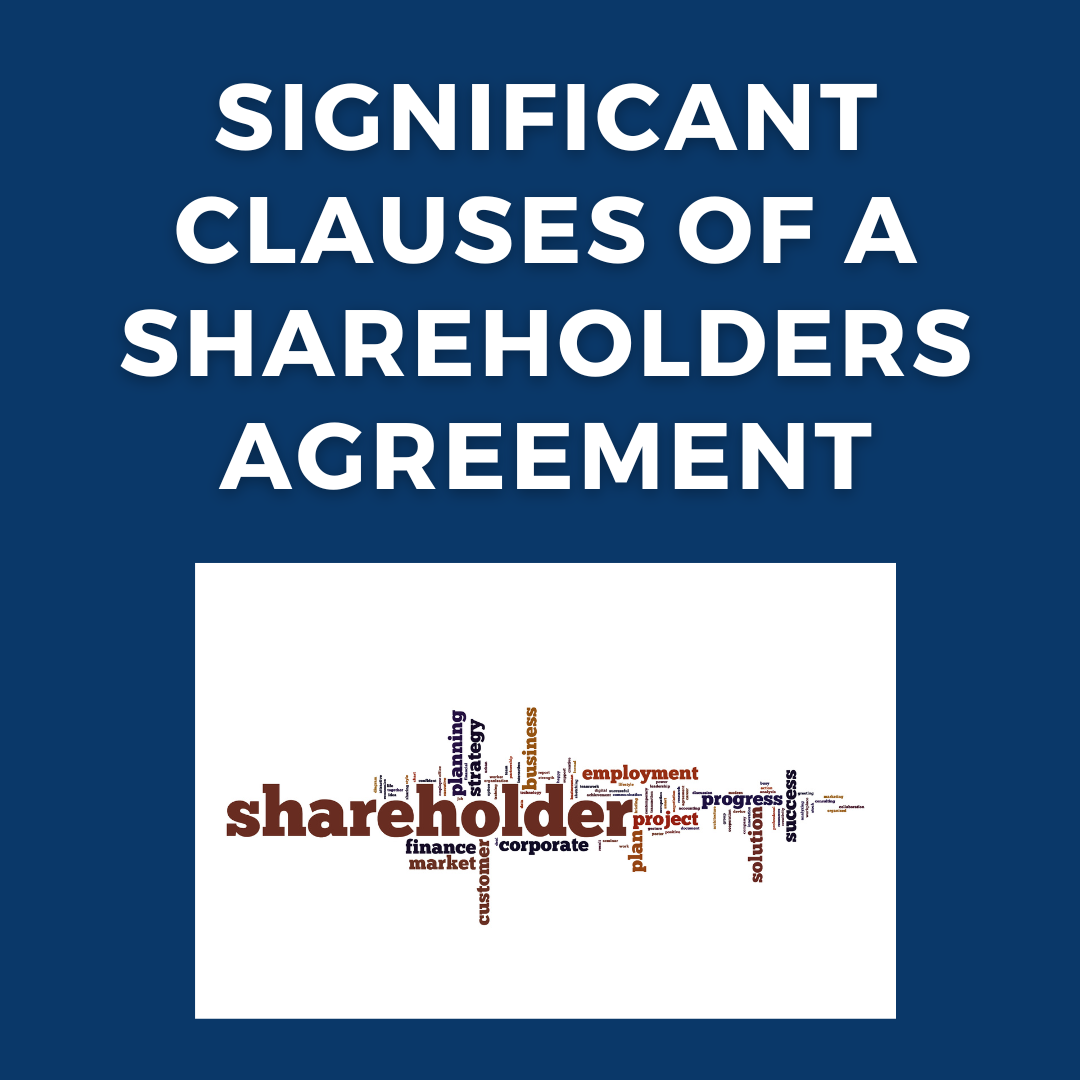This blog is written by Akhil Gupta, 5th year Law Student at National University of Study and Research in law, Ranchi. He was a participant of our Mergers & Acquisitions Course.
Significant clauses of a Shareholders’ Agreement
A shareholders’ agreement is a contract that specifies how a company will be handled and operated amongst its owners. It often addresses matters like the duties and rights of shareholders, how directors are chosen, how decisions concerning the company’s activities are made, and how disagreements are settled. An agreement that governs the relationship between shareholders, the management of the business, share ownership, rights, duties, and the protection of shareholders is sometimes referred to as a shareholders’ agreement. A shareholders agreement serves to safeguard the interests of the shareholders by establishing a clear set of rules and regulations for the administration and operation of the business. It can aid in ensuring that the business is conducted fairly and openly and in averting misconceptions and shareholder disputes. A shareholders’ agreement may also be a helpful instrument for luring investors and establishing the credibility of the firm because it shows that the latter is well-organized and has a defined course for the future. By preventing future management from abusing present shareholders’ interests, the shareholder agreement helps safeguard their interests. The agreement aids in protecting specific actions, such as dividend distribution and the issuance of new shares or debt, if new management is appointed or another organization buys the business.
The specific clauses of a shareholders’ agreement will depend on the specific needs and circumstances of the company and its shareholders. However, some common clauses that are often included in a shareholders’ agreement are:
- Purpose
- Shareholding
- Board of Directors
- Management & Control
- Capital Contribution
- Transfer of shares
- Deadlock
- Termination
- Governing law
- Confidentiality
- Pre-emptive rights & Anti-dilution
Let us understand each one elaborately:
-
Purpose
This clause sets out the purpose of the shareholders’ agreement and the nature of the company.
-
Shareholding
This clause sets out the details of the shareholding of each shareholder, including the number of shares held, the class of shares held, and any restrictions on the transfer of shares.
-
Board of Directors
This clause sets out the composition and powers of the board of directors, including the number of directors, the process for appointing and removing directors, and the responsibilities of the directors.
-
Management and control
This clause sets out the roles and responsibilities of the shareholders in relation to the management and control of the company, and may include provisions on voting rights, decision-making processes, and the allocation of profits and losses.
-
Capital contributions
This clause sets out the obligations of the shareholders to contribute capital to the company, and may include provisions on the timing and amount of capital contributions and the conditions under which additional capital may be required.
-
Transfer of shares
This clause sets out the rules and procedures for the transfer of shares, including any restrictions on the transfer of shares, and may include provisions on pre-emptive rights, tag-along rights, and drag-along rights.
-
Deadlock
This clause sets out the procedures to be followed in the event of a deadlock between the shareholders, and may include provisions on the appointment of an independent third party to resolve disputes. This situation arises when the shareholders are not able to come in consensus.
-
Termination
This clause sets out the circumstances under which the shareholders’ agreement may be terminated, and may include provisions on the buy-out of shares and the winding up of the company. This clause addresses the situation wherein the shareholder leaves the Company. This happens after the essential milestones; the founders offer the investors to buy out or exist option from the business. Hence, through this clause the investors are provided with the exit formalities.
-
Governing law
This clause sets out the jurisdiction under which the shareholders’ agreement will be governed, and may include provisions on the resolution of disputes through arbitration or other alternative dispute resolution mechanisms.
-
Confidentiality
This clause sets out the obligations of the shareholders to maintain the confidentiality of sensitive company information, and may include provisions on the disclosure of information to third parties.
-
Pre-emptive rights & Anti-dilution
Pre-emptive rights and anti-dilution clauses are provisions that can be included in a shareholders’ agreement to protect the interests of shareholders in a company. Pre-emptive rights give shareholders the right to maintain their ownership percentage in the company by allowing them to purchase additional shares of the company before they are offered to new investors. This can help to prevent dilution of the shareholders’ ownership percentage, which can occur when new shares are issued and the overall number of outstanding shares increases. An anti-dilution clause, on the other hand, is a provision that protects shareholders from dilution by adjusting the conversion ratio of their convertible securities (such as preferred stock or convertible bonds) in the event that the company issues new shares at a lower price. This can help to ensure that the value of the shareholders’ securities is not significantly reduced by the issuance of new shares.
-
Restrictions on Transfer of Shares
A restriction on transfer of shares clause is a provision that can be included in a shareholders’ agreement to limit the ability of shareholders to sell or transfer their shares in the company. This type of clause is typically used to protect the interests of the company and of the other shareholders by ensuring that the ownership of the company is stable and that new shareholders meet certain criteria. There are several types of restrictions on transfer of shares that can be included in a shareholders’ agreement, including:
Right of first refusal: This gives the company or the other shareholders the right to purchase the shares before they are offered to a third party.
Drag-along rights: This gives the majority shareholders the right to force the minority shareholders to sell their shares along with the majority shareholders when the majority sells their shares to a third party.
Tag-along rights: This gives minority shareholders the right to sell their shares along with the majority shareholders when the majority sells their shares to a third party.
Restrictions on transfer to specific parties: This prohibits the transfer of shares to certain parties, such as competitors or individuals who do not meet certain criteria.
-
Non-Compete & Non-Solicitation Provision
Non-compete and non-solicitation provisions are provisions that can be included in a shareholders’ agreement to protect the interests of the company and the other shareholders by limiting the ability of shareholders to compete with the company or to solicit its customers or employees after they leave the company. Therefore, these provisions can be useful tools for protecting the company’s intellectual property and confidential information and for preventing the loss of customers and employees. However, it is important to note that these provisions may be difficult to enforce and may be considered unenforceable if they are overly restrictive. As such, it is important for shareholders to carefully consider the potential implications of including these provisions in a shareholders’ agreement.
Understanding the Agreement through the lens of the Companies Act, 2013
A shareholder’s agreement is not required by law, but it can be a useful tool for establishing a clear set of rules and guidelines for the management and operation of the company and for protecting the interests of the shareholders. It is important to note that the provisions of a shareholder’s agreement must not conflict with the provisions of the Companies Act, 2013 or with the articles of association of the company. If there is a conflict, the provisions of the Companies Act, 2013 and the articles of association will take precedence. The Companies Act, 2013 does not specifically address shareholders agreements, but it does contain provisions that relate to the rights and responsibilities of shareholders in a company. These provisions include:
Section 47 & 48: This section outlines the rights and duties of shareholders in a company. It specifies that shareholders have the right to receive notice of and attend meetings of the company, the right to vote on resolutions put before the company, and the right to receive dividends and other distributions from the company.
Section 96: This section outlines the procedure for calling meetings of shareholders. It specifies that meetings of shareholders must be called by the directors of the company, and that notice of the meeting must be given to all shareholders.
Sections 107, 108, 109 & 110: These sections outline the procedure for voting at meetings of shareholders. It specifies that each shareholder has the right to one vote on each resolution put before the company, and that decisions of the company must be made by a majority of the votes cast.
Section 152: This section outlines the procedure for appointment of the directors of the company. It specifies that the appointment of directors must be approved by a resolution of the shareholders.
It is important to note that these provisions of the Companies Act, 2013 apply to all companies incorporated in India, regardless of whether or not they have a shareholder’s agreement in place. If a shareholder’s agreement conflicts with the provisions of the Companies Act, 2013, the provisions of the Companies Act, 2013 will take precedence.
CONCLUSION
In India, shareholders agreements are typically governed by state laws, and disputes related to shareholders agreements are typically heard in state courts. The Supreme Court of India may consider cases involving shareholders agreements if the case involves a federal issue or if the case has been appealed from a lower court. There are many clauses in the Shareholders Agreement, however, the above-mentioned are some of the most important clauses that a Shareholders Agreement must have. Therefore, it is pertinent to mention that shareholders agreement does not find its express mention under the Companies Act, 2013, however, it is governed under the provisions of the Companies Act, 2013 wherein certain rights & obligations are mentioned of the shareholders of the company.


